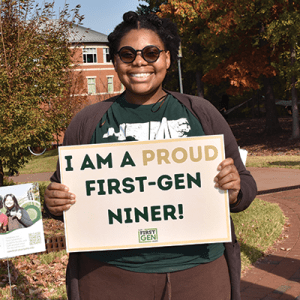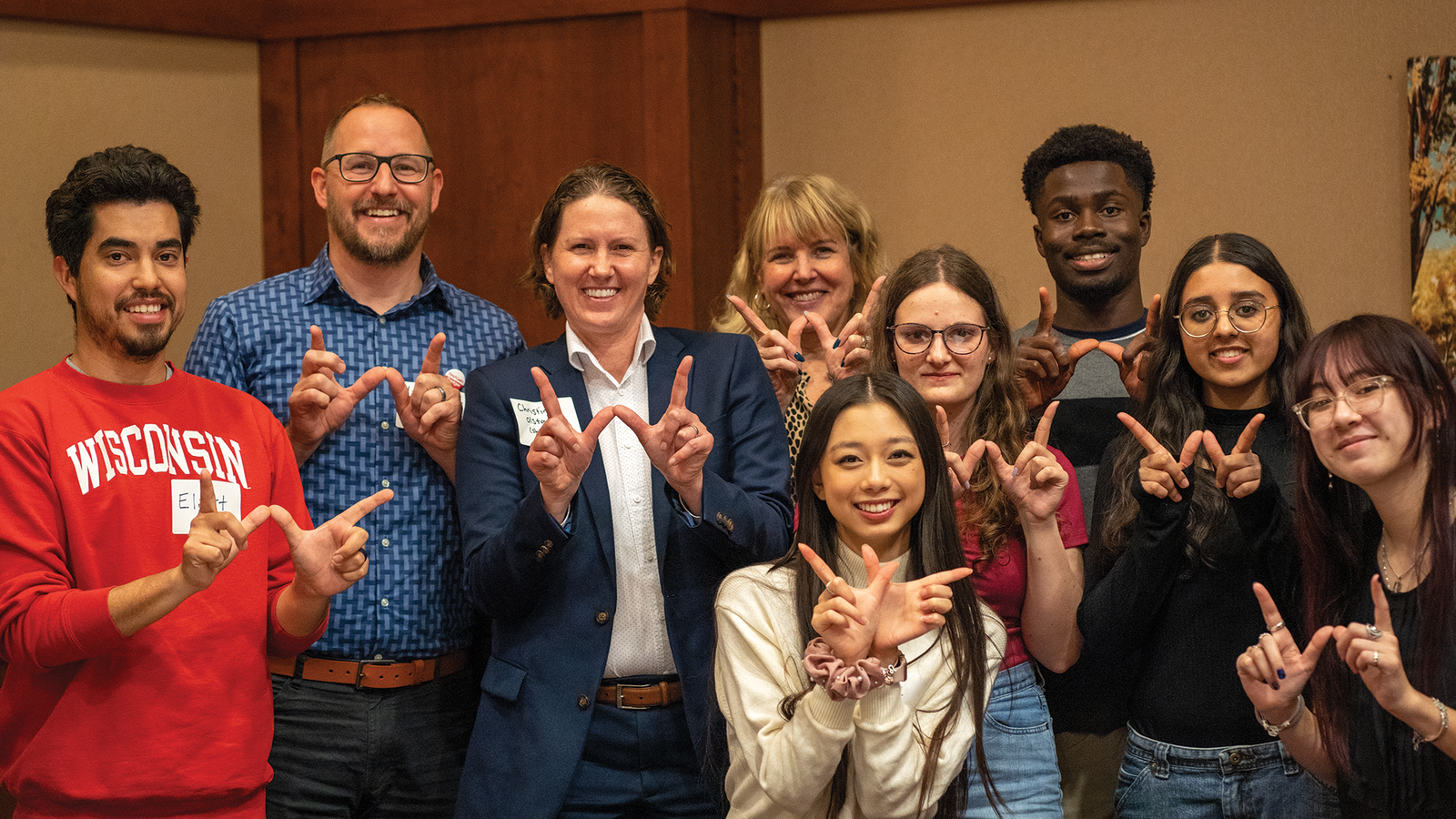First-generation students, a predominantly non-White, intersectional population, face distinctive challenges as they navigate the complex path to an undergraduate degree. Without the inherent guidance of a parent with collegiate experience, students can struggle to adapt to unfamiliar classroom and campus dynamics, connect with faculty and peers, and, ultimately, graduate.
Compounding the challenges of this student population, whose median family income is approximately half that of their counterparts, nearly one-third of first-generation students also have children or other dependents. These circumstances present obstacles postgraduation as they face more difficulty finding jobs and often earn substantially less than their more well-connected peers.
In response to increased enrollment of first-generation students, colleges are actively creating programs and forging partnerships designed to build community while providing support through mentorship, resources, and special events. Strong interpersonal and campus connections play a pivotal role in their success, and these initiatives offer the kinds of indispensable social and academic support that significantly increase the likelihood of graduation.
Notable examples of such efforts can be found at the University of Wisconsin-Madison, the University of North Carolina at Charlotte, and Syracuse University’s Martin J. Whitman School of Management, where each has designed programs tailored to meet the needs of first-generation students.
University of Wisconsin-Madison
The aptly named First-Generation Badgers launched this fall at the University of Wisconsin-Madison (UW-Madison). This pilot program, operated by the Student Affairs office, coordinates existing campus support services and plans specially curated events throughout the year to build community and celebrate the experience of first-generation students.
UW-Madison identifies first-generation students as those whose parents did not attend or did not graduate from a four-year institution, a demographic encompassing approximately one in five students who enrolled this year. Vice Chancellor for Student Affairs Lori Reesor, herself a first-generation student, recognizes the challenges of navigating college without familial guidance.
“We are thrilled to be starting this initiative in support of our first-gen students,” says Reesor. “I recall how difficult it was at times to be learning the ins and outs of college academics and campus life without guidance or experience from my family.”
First-Generation Badgers acts as an information hub, coordinating with representatives from a network of offices across the campus, including the Division of Diversity, Equity, and Educational Achievement; Student Affairs; the Center for Academic Excellence in the College of Letters & Science; and the Division of Enrollment Management.
Through a series of campus events called Badger Dialogues, UW-Madison provides an informal opportunity for students, faculty, and administrators to engage in meaningful conversation and share ideas about belonging in the university community. A recent discussion, focused on belonging as a first-generation student, was centered on student feedback on the pilot program.
“We hosted a small group of first-generation undergraduate and graduate students, who echoed the desire for increased community building, more easily navigable resources, and fostering a sense of belonging on campus,” says Jenny Bernhardt, communications director for Student Affairs. “Students were also excited about the new resource page online and potential mentorship program.”
The mentorship program, slated to begin in fall 2024, will foster connections between first-generation students and faculty or staff. Bernhardt has already received interest from potential mentors who are eager to participate.
University of North Carolina at Charlotte

University of North Carolina at Charlotte (UNC Charlotte), which identifies first-generation students as those whose parents did not attend college, recently hosted their second annual First-Generation Celebration Week. The weeklong series of events aimed to connect and empower first-generation students was developed through a partnership between Transition & Success Initiatives and the student organization First-Gen Niners.
First-Gen Niners was founded in 2020 by Lorenzo Hopper, PhD, assistant professor in public health sciences and faculty advisor for the student group. The group began, he explains, as an effort to “help [first-generation students] stay connected to the university and thrive, despite the academic stressors and challenges that the pandemic created.” First-Gen Niners remains dedicated to offering community, support, and guidance to the nearly 33% of enrolled students who identify as first generation.
“As a first-generation college graduate, I know firsthand how challenging it can be to balance the work, academic, and life expectations that students carry,” says Hopper.
Recognizing the importance of community connection, First-Gen Niners students volunteer at area locations, most recently the Jamil Niner Student Pantry and St. Jude Affiliate Clinic at Novant Health Hemby Children’s Hospital. “We believe that promoting a culture of volunteerism helps the students to build community, engage with their peers, and create lifelong habits of civic engagement,” says Hopper.
 There is a definite sense of solidarity within the group, whose original student members organized a fundraiser in order to purchase the first honor cords specifically for graduating first-generation seniors. The special cording ceremony, now made possible through support from Transition & Success Initiatives, is part of the annual First-Gen Graduation Celebration. This year’s keynote speakers at the celebration were current first-generation students who shared their personal experiences as First-Gen Niners.
There is a definite sense of solidarity within the group, whose original student members organized a fundraiser in order to purchase the first honor cords specifically for graduating first-generation seniors. The special cording ceremony, now made possible through support from Transition & Success Initiatives, is part of the annual First-Gen Graduation Celebration. This year’s keynote speakers at the celebration were current first-generation students who shared their personal experiences as First-Gen Niners.
In recognition of the intrinsic value of shared experience, UNC Charlotte has developed a First-Gen Faculty and Staff Directory to help connect participating students with current and former faculty and staff who were also first-generation students.
Students can also visit the school’s I Am First Gen web page to access information about specialized programs and events; individual stories and personal advice from first-generation faculty, staff, and alumni; and direct connection with the First-Gen Niners student organization.
Syracuse University Martin J. Whitman School of Management
The Whitman First Program at Syracuse University’s Martin J. Whitman School of Management (Whitman) was launched in response to the surge in first-generation enrollment — up from 12% in fall 2022 to 19% in fall 2023. The program aims to provide mentorship and support services.
For Whitman’s first-generation undergraduates, whose parents have not graduated with a four-year degree, participation in the program is not required, but more than 30% of those who identify as first generation have signed on.
Lindsay Quilty, assistant dean of undergraduate programs at Whitman, emphasizes the program’s alignment with Syracuse’s existing efforts. “The university already does a great deal to support first-generation students, so we’re not trying to duplicate those efforts. But Whitman is committed to student success, and being able to tailor [the Whitman First Program], specifically to help our first-year students thrive in the business school environment, is important for the Whitman School,” explains Quilty.
The program connects students with a faculty or staff member who was also once a first-generation student in a one-on-one mentorship designed to provide a sense of belonging. Quilty says the presence of a mentor in a first-year student’s life gives them a significantly higher chance of returning for their sophomore year.
Mentor and assistant professor of accounting Sebastian Andreas Tideman-Frappart, PhD, is excited to offer the kind of one-on-one support that was missing from his own first-generation college experience. “This is not just a single meeting. We’re developing a relationship so my mentee knows he can approach me with any questions throughout his time at Whitman and beyond, and I will make myself available to help him. First-generation students face a lot of challenges that we, as mentors, can help solve.”
The Whitman First Program strategically addresses some of those key challenges with formal sessions on topics such as financial awareness, internship and study abroad programs, classroom technology, and deciphering business jargon.
“Our [program] not only helps first-generation students realize it’s OK to ask for support … but is also an intentional way of giving them the skills, confidence, and resources they need to succeed both now and well into their business careers,” Quilty says.●
This article was published in our January/February 2024 issue.
Above: University of Wisconsin-Madison Vice Chancellor for Student Affairs Lori Reesor and Dean of Students Christina Olstad — both of whom are first-generation graduates — celebrate with fellow Badgers at the National First-Generation College Celebration Day Reception.




















